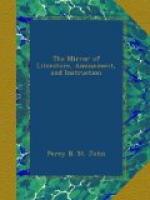She was often in danger, when walking, from carriages, &c., in consequence of her absence of mind. When engaged in a poem of some length, she has often forgotten her meals. A single incident, illustrating this trait in her character, is worth relating:—She went out early one morning to visit a neighbour, promising to be at home to dinner. The neighbour being absent, she requested to be shown into the library. There she became so absorbed in her book, standing, with her bonnet unremoved, that the darkness of the coming night first reminded her she had forgotten her meals, and expended the entire day in reading.
She was peculiarly sensitive to music. There was one song (it was Moore’s Farewell to his Harp) to which she “took a special fancy;” she wished to hear it only at twilight—thus, with that same perilous love of excitement which made her place the windharp in the window when she was composing, seeking to increase the effect which the song produced upon a nervous system, already diseasedly susceptible; for it is said, that whenever she heard this song she became cold, pale, and almost fainting; yet it was her favourite of all songs, and gave occasion to these verses, addressed, in her fifteenth year, to her sister.
When evening spreads her shades around,
And darkness fills the arch
of heaven;
When not a murmur, not a sound
To Fancy’s sportive
ear is given;
When the broad orb of heaven is bright,
And looks around with golden
eye;
When Nature, softened by her light.
Seems calmly, solemnly to
lie;
Then, when our thoughts are raised above
This world, and all this world
can give,
Oh, Sister! sing the song I love,
And tears of gratitude receive.
The song which thrills my bosom’s
core,
And, hovering, trembles half
afraid,
Oh, Sister! sing the song once more,
Which ne’er for mortal
ear was made.
’Twere almost sacrilege to sing
Those notes amid the glare
of day;
Notes borne by angels’ purest wing,
And wafted by their breath
away.
When, sleeping in my grass-grown bed,
Shouldst thou still linger
here above,
Wilt thou not kneel beside my head,
And, Sister! sing the song
I love?




